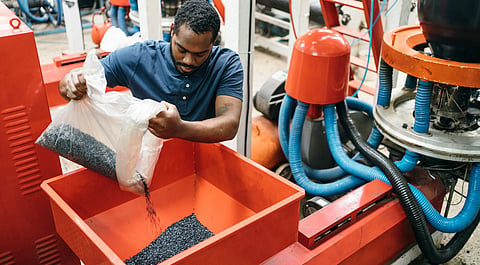

Addressing emissions and releases of plastics throughout their life cycles is critical for mitigating plastic pollution. This requires strategies to minimise emissions during production, improve waste management practices, and promote sustainable recycling technologies to reduce environmental and health impacts.
Negotiations in Busan are focusing on tackling these emissions and releases at every stage of the plastic life cycle—from production to disposal. This holistic approach aims to mitigate risks associated with greenhouse gas (GHG) emissions, toxic chemical releases, and microplastics.
The concept of “emissions and releases of plastics across their life cycles” highlights the stages and processes that contribute to environmental pollution and degradation. This begins with raw material extraction and production, where fossil fuels are processed into plastic polymers, releasing GHGs and volatile organic compounds (VOCs). During manufacturing, energy-intensive processes such as molding and extrusion generate carbon emissions and air pollutants, particularly when fossil fuels power the electricity supply.
In the consumer phase, plastic products shed microplastics due to wear and tear, leach harmful chemicals under heat or UV exposure, and release microfibers into wastewater during washing. Inadequate waste management exacerbates these issues—incineration produces toxic dioxins and furans, landfilling leads to chemical leachate contaminating soil and groundwater, and littering directly pollutes ecosystems.
Recycling, though beneficial, is not without challenges, as mechanical and chemical recycling can emit GHGs, particularly when processes are incomplete, resulting in downcycling or waste disposal. Furthermore, global transport and trade of plastics add to emissions through shipping and logistics, with additional risks like pellet spills and supply chain pollution.
Policymakers are deliberating on methods to monitor and reduce emissions during plastic manufacturing, transportation, use, and end-of-life processing, including incineration and landfilling.
The Philippines has taken a proactive stance in addressing emissions across the plastic life cycle, while countries such as Japan, the United States, Panama, Sri Lanka, and Thailand, along with groups like the EU, support retaining these provisions in the draft document. Although the Sri Lankan delegation has not explicitly endorsed a specific option, they have emphasised the importance of addressing both intentional and unintentional incidents, such as plastic pellet spills. The EU has recommended expanding the scope to include the phase-out of monomers in addition to polymers, highlighting emissions throughout the plastic life cycle.
However, proposals from the Gulf Cooperation Council (GCC) members, such as Kuwait, along with Russia and Iran, advocate for including these provisions under waste management rather than treating them as standalone measures. India has similarly proposed relocating specific clauses to the waste management section. Kuwait has suggested removing clauses related to regulating and reducing emissions from the production phase, while Russia has opposed the inclusion of upstream measures altogether.
To download the whole report, click here.
This is a click to zoom map. View the larger image by clicking on it